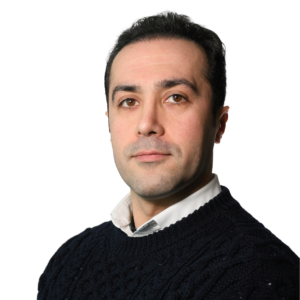
Role: Principal Consultant
Career Area: Research, Modelling and Analysis
Location: Cork
My role at SYSTRA
I am a Chartered Engineer (CEng MIEI) and a Principal Transportation Consultant within the Data, Modelling and Analytics team. Holding a PhD in Transportation Engineering and bringing over a decade of experience, I specialise in transport modelling, traffic engineering, and research into emerging transportation systems.
My role involves leading business development efforts, cultivating strong client relationships, and ensuring the successful delivery of projects, with a focus on client satisfaction and effective project management.
Additionally, I oversee technical teams, providing expertise in transport modelling and transport impact assessment to deliver high-quality, impactful results.
My career journey
I began my journey with a Bachelor’s degree in Civil Engineering, followed by a Master’s in Transportation Engineering, which laid the foundation for my technical expertise. After gaining practical experience as a traffic and highways engineer, I pursued a PhD in Transportation Engineering at Trinity College Dublin, specialising in autonomous vehicles and transportation systems.
My career has spanned roles in consulting, technical leadership and academia, including positions at AECOM and now SYSTRA, where I apply over a decade of experience in transport modelling, project management and strategic planning, to deliver impactful solutions in the transportation sector.
We asked Amin…
When did you realise this was the career path for you?
I realised this was the career path for me during my early years as a traffic and highways engineer. Working on real-world projects, such as road construction and safety auditing, gave me a tangible sense of the impact I could have on infrastructure and communities. This practical exposure ignited my passion for transportation systems, which deepened further during my Master’s studies, and was solidified when I pursued a PhD in Transportation Engineering. The blend of technical challenges, innovation, and the opportunity to make meaningful contributions to society, confirmed this was the ideal career path for me.
Have you got any words of wisdom for someone starting out in a similar role?
For anyone starting out in this field, my advice is to embrace a mindset of continuous learning and curiosity. Begin by building a strong foundation in technical skills and gaining practical experience – every project, no matter how small, teaches you something valuable. Seek out mentors who can guide you, but also be proactive in taking ownership of your growth by learning tools like transport modelling software, and staying informed about emerging trends such as autonomous vehicles and sustainable transportation. Lastly, focus on communication and collaboration, as success in this field often hinges on your ability to translate complex technical concepts into actionable insights for diverse stakeholders. Patience and persistence will take you far, so don’t be afraid to start small and grow steadily.
How does SYSTRA stand out from the rest as a great place to work?
SYSTRA stands out as a great place to work through its dedication to its core values: Excellence, Connected Teams and Bold Leadership. The company fosters a collaborative culture, bringing together multidisciplinary specialists to address complex transportation challenges, which not only promotes professional growth but also ensures the delivery of innovative and high-quality solutions. SYSTRA’s commitment to excellence drives continuous improvement, while its bold leadership empowers employees to embrace change and contribute to transformative projects. Moreover, the company both values and recognises the dedication and expertise of its people, appreciating that their contributions are central to driving success. This supportive and dynamic environment makes SYSTRA a truly exceptional employer in the transportation engineering sector.
With such power in diversity, what unique perspective do you bring to the table?
With a PhD in Transportation Engineering and over a decade of experience spanning multiple countries and organisations, I bring a unique blend of global insight and multidisciplinary expertise to the table. My academic journey and professional roles have exposed me to diverse methodologies, cultures and challenges, enabling me to approach transportation problems with a well-rounded and innovative perspective. This diversity of experience not only aligns with SYSTRA’s values of collaboration and bold leadership, but it also equips me to bridge gaps between technical solutions and practical implementation in varied contexts. By combining my technical skills with an appreciation for different viewpoints, I contribute to creating inclusive, impactful and forward-thinking transportation solutions.
Where is the place that has inspired you the most?
The place that has inspired me the most is not a single location but rather rural roads, which are often overlooked in terms of infrastructure and safety measures. These roads, common in many countries, pose significant risks, particularly for vulnerable road users like pedestrians and cyclists. During my Master’s studies I worked with real accident statistics from my hometown, provided by the traffic police, which highlighted the severity of the safety challenges on such roads. This experience inspired me to use Artificial Neural Networks in my research to develop a model for predicting accident hotspots, identifying the root causes, and proposing mitigation strategies to reduce risks. This initial focus on rural road safety sparked my broader interest in advanced intelligent transportation technologies, such as autonomous vehicles and ITS facilities, which have the potential to transform road safety. This journey has shaped my academic and professional path, motivating me to work towards safer transportation systems for vulnerable road users worldwide.
What does true sustainability really mean to you?
To me, true sustainability in transportation means creating systems that are efficient, environmentally responsible and equitable. It’s about using advanced technologies, like autonomous vehicles and ITS, to enhance safety, reduce emissions, and ensure accessibility for vulnerable road users. Sustainability also involves considering the full lifecycle of transport solutions, ensuring they adapt to future challenges and improve the long-term quality of life for communities.
What would a green future look like?
To me, a green future would be one where we harness the limitless potential of renewable energy sources, such as the electromagnetic forces freely available in the atmosphere, much like the visionary ideas proposed by Nikola Tesla. This would lead to a world where transportation, infrastructure and industries are powered by clean, sustainable energy, significantly reducing our environmental impact and creating a more resilient, sustainable society for future generations.
How do you look after your wellbeing outside of work?
I prioritise my wellbeing by exercising regularly, which has been a key part of my lifestyle for several years. It helps me stay physically and mentally fit, providing balance and energy to tackle both personal and professional challenges.
If you could spend your lunchbreak with someone you really admire, who would you choose?
If I could spend my lunchbreak with someone I really admire, I’d choose Robert Kiyosaki. I believe we live in an era where understanding cash flows and financial markets is more critical than ever, and I’d love to learn his expertise. Another person I deeply admire, but will never have the chance to meet, is Nikola Tesla. He was the epitome of an engineer ahead of his time – his visionary work and innovative ideas weren’t fully understood or appreciated in his era, but his legacy continues to inspire me.
If you had to pick, which mode of transport would you use for the rest of your life?
If I had to pick a mode of transport for the rest of my life, I would choose rail transport, particularly if the network is well-established, offers good service frequency, and provides affordable fares for daily commuting. However, if those conditions aren’t met, I would opt for private transport, such as using my own car, for greater flexibility and convenience.

 Australia
Australia  Brazil
Brazil  Canada
Canada  Chile
Chile  China
China  Columbia
Columbia  Denmark
Denmark  Egypt
Egypt  France
France  India
India  Indonesia
Indonesia  Italy
Italy  Malaysia
Malaysia  New Zealand
New Zealand  Norway
Norway  Panama
Panama  Peru
Peru  Poland
Poland  Portugal
Portugal  Saudi Arabia
Saudi Arabia  Singapore
Singapore  South Korea
South Korea  Spain
Spain  Sweden
Sweden  Taiwan
Taiwan  Thailand
Thailand  Türkiye
Türkiye  United Kingdom
United Kingdom  United States
United States  Vietnam
Vietnam